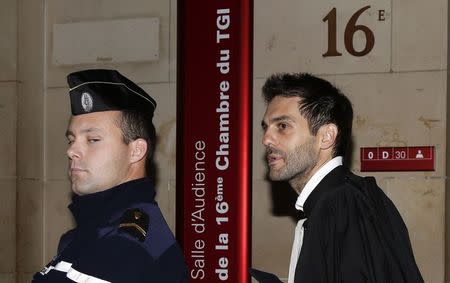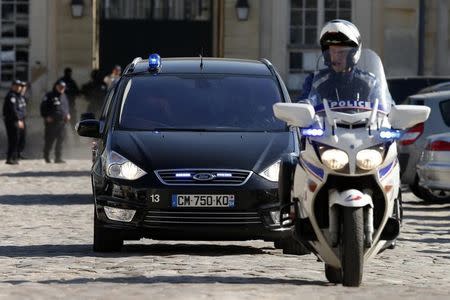French court jails first returning Syria jihadi for seven years
By Chine Labbé PARIS (Reuters) - A French man was sentenced to seven years in prison on Thursday for having joined an Islamist group in Syria, the first such ruling in France where dozens more returning volunteer fighters are being held pending trial. Flavien Moreau, a 27-year-old described in court documents as a determined Islamist militant, was convicted for joining the Islamist group, a terrorism offence, more than a year after he returned from what he said was a 10-day stint in Syria with the unnamed group. The sentencing, in line with a prosecutor's recommendation, is likely to provide a benchmark for dozens of other returned jihadis, under surveillance or being held in French jails and whom officials view as a major security threat. "This is a purely punitive response without any thought for what awaits Mr. Moreau when he gets out," said Pierre Darkanian, Moreau's lawyer. Another man, aged 26, was sentenced to four years in jail including 18 months' suspended sentence on a similar charge. French authorities say that of around 1,000 jihadis who left France for Syria, 118 have returned. Judicial authorities, fearing attacks by returning jihadis, have taken a tough stance, allowing them to be tried for links to "terrorist" groups. Mehdi Nemmouche, a Frenchman who fought in Syria, was jailed in Belgium for the killing of three people at a Jewish museum in Brussels. But deradicalisation experts argue that heavy jail terms and housing all jihadis in the same prison, as is currently done, could build resentment and incite further radicalisation. Darkanian declined to say which group his client had joined but said it was neither Islamic State nor Nusra Front. Both are listed as terrorist organisations. Court documents said Korean-born Moreau, adopted at 15 months by a family in Nantes, was a determined militant who told his parents he had no problem dying for Islam and made several failed attempts to reach Syria before succeeding in 2012. However, he told French media that he had left because smoking was against the group's rules and he suffered withdrawal despite having brought replacement chewing gum. After serving briefly as a policeman, he surrendered his weapon to his "Emir", or commander, and left the country. His departure underscored what lawyers say is a lack of preparation on the part of Western volunteers often discouraged by difficult conditions, infighting between Islamist groups and even torture at the hands of other militants in Syria. (Reporting by Chine Labbe; Writing by Nicholas Vinocur)

 Yahoo News
Yahoo News 

